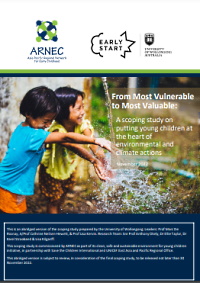From most vulnerable to most valuable: A scoping study on putting young children at the heart of environmental and climate actions
The scoping study recognises that there is currently insufficient attention given to the immediate and longer term needs of children in climate change and environmental actions. It leverages the Nurturing Care Framework for ECD (NCF; WHO et al., 2018), a consensus model incorporating both the needs and rights of young children within their caregiving relationships, to better understand and communicate the impacts of climate change and environmental degradation (CC&ED) on ECD. The Study also elaborates a child-centred approach for governments, decision makers, development agencies, advocacy groups, and key stakeholders to support the incorporation of young children’s needs and rights when considering CC&ED impacts and responses, as well as adaptation and mitigation strategies. Through this process, examples of good practice and areas of innovation and challenges are identified and considered in relation to future planning.
This document is an abridged version of the three main components taken from the scoping study.
1. Global Impacts Survey and Desk Review
2. Sub-Regional Analysis and Case Studies
3. Looking Forward: Recommendations and the Child-Centred Approach
Related links:
• Summary brief
• Full version
• Webinar
• UNICEF EAPRO advocacy brief
• Thematic brief on clean, safe and secure environments
Organization: University of Wollongong, Asia-Pacific Regional Network for Early Childhood (ARNEC)
Year: 2022
Language: English
Web link: https://mcusercontent.com/bd0894fcc8781bc7016abf710/files/3067436a-a465-8565-ce9e-1285e1e2f427/Scoping_Study_Abridged_version_Nov82022.pdf





